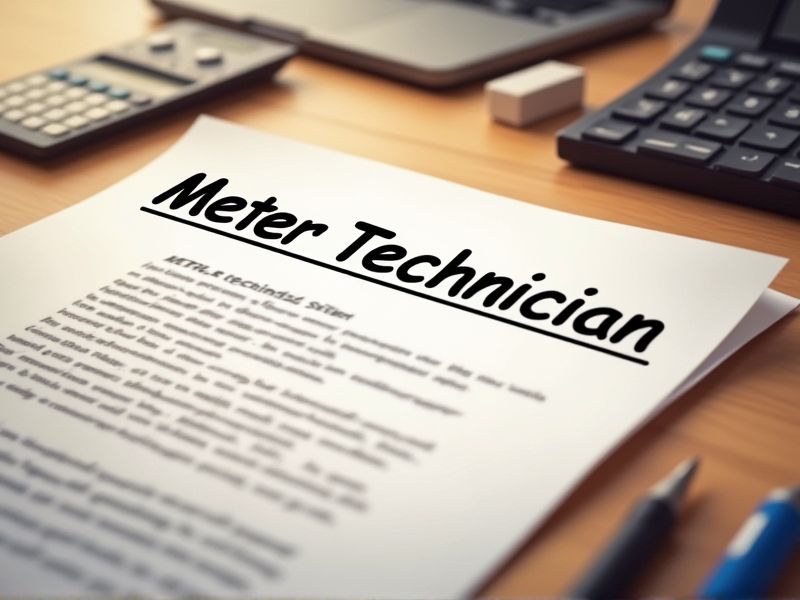
Meter Technicians ensure accurate and reliable measurements of electricity, water, or gas consumption, which is critical for utility billing and resource management. Proper certifications enhance their expertise in handling and maintaining metering equipment, reducing the risk of errors or malfunctions. Certifications also align with regulatory standards, ensuring compliance and safety in their operations. Here are some crucial certifications you may need for a Meter Technician role.
Certified Electric Meter Technician (CEMT) Certification
The Certified Electric Meter Technician (CEMT) Certification standardizes skills and ensures technicians have the necessary expertise for accurate electricity metering. Employers often require CEMT Certification to ensure technician competence and compliance with industry standards. Certified technicians help reduce errors in meter installations and maintenance, ultimately enhancing service reliability. Certification may lead to improved career advancement opportunities and higher earning potential for those in the field.
Journeyman Electrician License
A Journeyman Electrician License is essential for a Meter Technician as it ensures the technical competence required for handling complex electrical systems. This licensing verifies that the technician possesses the necessary understanding of electrical safety protocols, reducing the risk of accidents and ensuring compliance with industry standards. Having a license reflects a level of professionalism and trustworthiness, which is crucial for employers or clients relying on accurate and safe meter services. Regulations often mandate such licensing to maintain a uniform standard across the industry, enhancing overall service reliability.
OSHA 10-Hour Safety Certification
The OSHA 10-Hour Safety Certification equips meter technicians with essential knowledge to identify potential workplace hazards, reducing the likelihood of accidents. Having this certification shows compliance with federal safety regulations, promoting a safe working environment. It instills a culture of safety that is critical in handling electrical equipment and managing high-risk field operations. Employers often require this certification to ensure all field technicians are prepared to implement best safety practices, which can lower insurance costs and liability issues.
Lockout/Tagout Safety Certification
Lockout/Tagout Safety Certification is essential for meter technicians because it ensures they are equipped to prevent accidental energy release during maintenance. This certification reduces the risk of serious injuries from unexpected equipment activation. Proper lockout/tagout procedures help in complying with occupational safety standards and regulations. Training instills a safety-first mindset, promoting a culture of caution and awareness in work environments.
NFPA 70E Electrical Safety Certification
The NFPA 70E Electrical Safety Certification provides meter technicians with critical knowledge of workplace electrical safety standards, thus reducing the likelihood of electrical injuries. This certification ensures compliance with safety regulations, minimizing the risk of accidents and work-related fatalities. Employers often require this certification as it demonstrates a technician's competence in identifying and mitigating electrical hazards. Ensuring technicians are well-versed with these guidelines fosters a safer working environment and promotes long-term operational efficiency.
National Electrical Code (NEC) Compliance Certification
National Electrical Code (NEC) Compliance Certification ensures that a meter technician understands and adheres to standardized safety protocols, which reduces the risk of electrical accidents during installations and maintenance. Understanding NEC standards equips technicians with the knowledge to handle complex electrical systems efficiently, minimizing downtime and errors. Certification signifies that the technician is qualified, instilling confidence in employers and clients regarding their professionalism and expertise. Certified compliance with NEC standards ensures all electrical work is both code-compliant and safe, which is crucial for successful inspections and overall system reliability.
Calibration and Instrumentation Certification
Calibration ensures that the meters they work with deliver accurate measurements, which is crucial for billing and safety compliance. Certification in instrumentation validates a technician's expertise, ensuring adherence to industry standards and reducing the risk of errors. It enhances trust between utilities and customers by guaranteeing reliable performance of metering equipment. Regular certification updates a technician's skills, keeping them informed about technological advancements and regulatory changes.
NCCER Electrical Certification
Obtaining the NCCER Electrical Certification equips a meter technician with standardized skills, ensuring they meet industry-established proficiency levels. This certification often leads to increased job opportunities as employers prefer candidates with recognized credentials. By completing the NCCER program, technicians demonstrate a commitment to safety and quality, critical factors in reducing workplace incidents. Certification enables career advancement prospects, with many organizations tying promotions and pay increments to credentialed expertise.
Arc Flash Awareness Certification
Arc Flash Awareness Certification is needed for a Meter Technician because it ensures they understand the hazards associated with electrical systems, reducing the risk of accidents. This certification provides crucial knowledge on safety protocols, potentially preventing injury or fatalities. Understanding arc flash risks allows technicians to implement proper procedures, enhancing safety and efficiency on the job. Employers benefit from reduced liability and compliance with OSHA regulations by ensuring their technicians are certified.
First Aid/CPR Certification
Obtaining First Aid/CPR certification is crucial for meter technicians because their work often involves exposure to high-voltage equipment, increasing the risk of electrical shock. Certification equips them with essential skills to manage emergencies, such as loss of consciousness or stoppage of breathing, on-site. Many utility companies require this certification to ensure technicians can respond adequately to both their own and colleagues' health crises. Possessing these skills enhances workplace safety and can be a decisive factor in reducing the severity of injuries, potentially saving lives.
Summary
By obtaining certifications, you can enhance your technical skills and credibility as a Meter Technician. This often leads to better job opportunities and career advancement. Employers may express increased confidence in your capabilities, improving job security. Your ability to troubleshoot and maintain metering systems likely becomes more effective, potentially resulting in fewer errors and increased efficiency.
